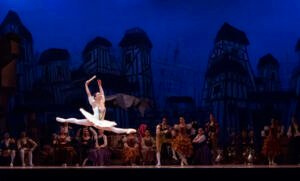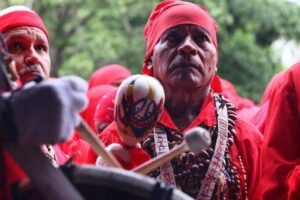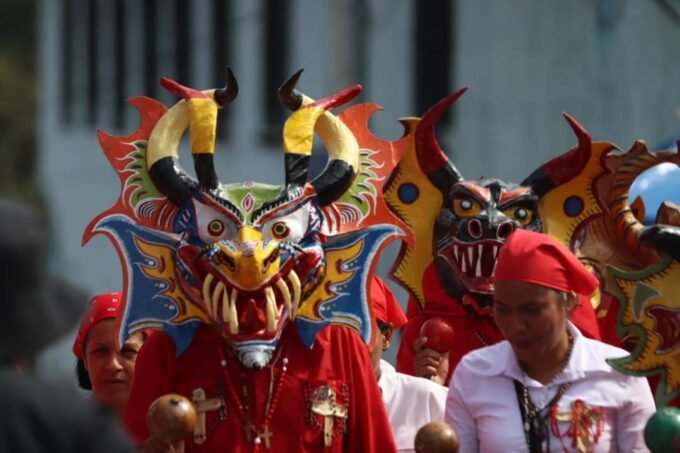Venezuela has a rich and diverse cultural landscape that combines indigenous, Spanish, African and Caribbean influences. The country’s cultural expressions are shaped by its unique history, resulting in a fascinating and complex mix of traditions that continue evolving. From vibrant art and music to delicious cuisine and lively celebrations, every aspect of Venezuela’s culture embodies a distinctive identity deeply rooted in its heritage.

Indigenous Heritage: Venezuela has a significant indigenous population of various ethnic groups, such as the Wayuu, Warao, Pemón, Piaroa and Yanomami. Indigenous culture has contributed to the country’s traditions, spiritual beliefs, crafts and agricultural practices.
Spanish colonial influence: Spain colonized Venezuela in the 16th century, leaving an impact on language, architecture, religion, and social structures.
Afro-Venezuelan traditions: African traditions and cultural elements brought by Africans have strongly influenced Venezuelan culture. Afro-Venezuelan communities have preserved their music, dance and traditional manifestations.

Music
Venezuela has a vibrant music scene with diverse genres. Traditional Venezuelan music includes joropo, a lively musical and dance style; gaitas, a popular genre during Christmas festivities; and coastal drums, among other rhythms. The country has also produced talented musicians such as music conductors Gustavo Dudamel, Domingo Hindoyán and Diego Matheuz, among others distinguished members of the internationally renowned System of Children and Youth Orchestras and Choirs of Venezuela.
Visual Arts
Venezuelan artists have made notable contributions to the visual arts worldwide. Artists such as Armando Reverón, Carlos Cruz-Diez, Jesús Soto, among others, have gained international recognition for their innovative painting and kinetic approaches. The country is also home to different important museums, such as the National Gallery, the Museum of Fine Arts, the Museum of Printing and Design and the Museum of Contemporary Art of Caracas, along with local museums in the main capitals of the different Venezuelan regions.
Literature
Literature is undoubtedly one of the spearheads of the political, social and cultural project of the Bolivarian Revolution, Venezuela has a rich literary tradition with recognized and prestigious authors such as Andrés Bello, Teresa de la Parra, Rómulo Gallegos, Arturo Uslar Pietri, Miguel Otero Silva, Ana Enriqueta Terán, Luis Britto García, Rodolfo Santana, Rafael Cadenas, Ramón Palomares, among others. Venezuelan literature explores national identity, social issues and human experience, in its different genres of prose, poetry and theater.
Publishing Industry
Venezuela has a strengthened industry supported by the State through the Ministry of People’s Power for Culture, made up of the Book and Reading Platform directed by the National Book Center (CENAL), the governing body of cultural policy for the book, reading and literary production sector.
Traditional Festivals
Venezuela celebrates numerous colorful and vibrant festivals throughout the year. The most important ones are the Dancing Devils of Corpus Christi, El Callao Carnival, Parranda de San Pedro, San Juan Bautista and San Benito Drums, among many others. Some of these traditional festivities have been designated Non-Tangible Cultural Heritage of Humanity by UNESCO.
Film Industry
With more than 120 years of history, Venezuela has a film production that shows the richness of a country, not only from its landscapes, but also from its stories and particularities.
Venezuelan cinematography enjoys great international prestige, participating and obtaining countless awards in some of the most prestigious festivals in the world. Venezuela has an important installed capacity which allows developing any film project in the country. Given its beautiful natural locations, the Center National Autonomous Cinematography (CNAC), the governing body of cinema in the country, is in charge of offering the country as a destination for filming, private or in co-production. Likewise, La Villa del Cine, the state’s film producer company, has big studios and first-class technical equipments, and Amazonia Films is the national distributor of cinematographic content for the different exhibition platforms.
Performing Arts
Theatre
Works by Venezuelan playwrights such as César Rengifo, Rodolfo Santana, José Ignacio Cabrujas, Román Chalbaud, Isaac Chocrón, Gustavo Ott and Elio Palencia are frequently performed both locally and abroad. The stage activity is extensive in many states of the country and the language of national authors is combined with classic works of universal theater or the latest searches for stage performance, addressing all types of themes
The theatrical billboard offers diversity through the Caracas Theater Circuit. On a national scale we have the theatre infrastructure provided by the regions, spaces that are both state and group. There are theatre festivals such as the Progressive Theatre Festival, organized by the Bolivarian Government, bringing together national and foreign groups.
The training system includes recognized theater schools as well as the Experimental University of the Arts (UNEARTE), which offers the professionalization of the theatrical profession by graduating in Direction, Production, Acting and Theater Design.
Dance
In the country is wide and diverse like its territory, ranging from classical ballet, to contemporary traditional and urban dance styles. With 450 groups throughout the country with a National Dance Company Foundation that has two casts, one of traditional dance and the other contemporary, and the two companies based in the Teresa Carreño Theater: Ballet Teresa Carreño and Teresa Danza Contemporánea.
Opera
Venezuela is a country with an operatic tradition, since the end of the 19th century, with the opening of the Caracas Theater, which was followed by others such as the Municipal Theater, the Maracay Opera Theater, Baralt Theater of Maracaibo and the most important cultural centre in the country, the Teresa Carreño Theater, where dramas and comedies from the most famous operatic composers have seasons throughout the year.
Circus
In the country there is a vibrant social circus movement, which provides important shows both nationally and internationally, mixing other areas such as opera, there is a National Circus Art Network that organizes the sector and offers training in communities throughout the country.

